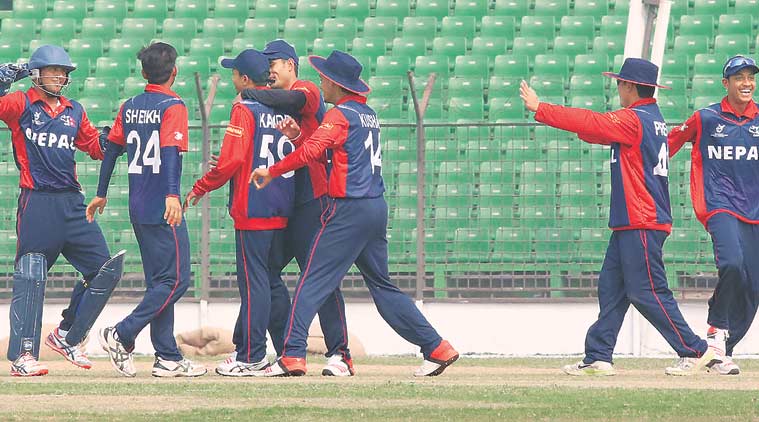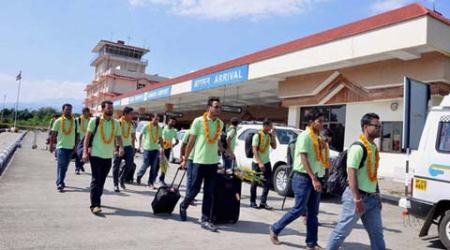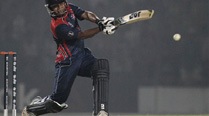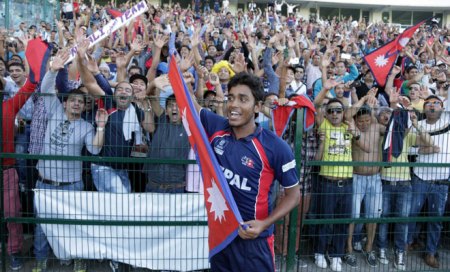This Nepal-India story is about help, hope beyond borders
 The Nepal team in action: ‘We are getting calls from everywhere. The PM also called us’
The Nepal team in action: ‘We are getting calls from everywhere. The PM also called us’
Ever since they shocked New Zealand in the opening match of the cricket Under-19 World Cup at Fatullah on Thursday, the Nepalese team has been flooded with congratulatory phone calls. “Calls are coming from everywhere. Even the Prime Minister (K P Sharma Oli) called, wishing us luck for tomorrow’s match,” says Aarif Sheikh, the team’s soft-spoken vice-captain.
On Saturday, Nepal play Ireland, a team they have dominated lately. And if they pull off another victory, they will all but advance to the quarterfinals, which would be their best performance since they lifted the Plate (second tier) trophy in 2006.
 Rising from rubble, Nepal football hopes to find feet
Rising from rubble, Nepal football hopes to find feet BCCI should help us the way it backed Sri Lanka: Nepal coach
BCCI should help us the way it backed Sri Lanka: Nepal coach Nepal takes guard on world stage after years of playing in the nets
Nepal takes guard on world stage after years of playing in the nets Lohri joy for young cricketer, called for India U-19 World Cup
Lohri joy for young cricketer, called for India U-19 World Cup- Future of game safe in Asia
 Song and dance as Nepal scale a cricketing Everest
Song and dance as Nepal scale a cricketing Everest
That, for Nepal, would complete a story of triumph after twin disasters — one natural, the other man-made.
Among the worst-hit by the earthquake last April was Nepal’s main cricketing facility, Tribhuvan University International Cricket Ground. “The new indoor nets facility was destroyed,” says Sheikh, adding that the senior team had to go to Dharamsala in June to prepare for the World T20 qualifiers.
Soon, the country faced another setback — an economic blockade that stopped the flow of essential goods, including fuel, from India following protests over Nepal’s new constitution by the Madhesis.
“Diesel was selling at 450-500 rupees a litre (roughly Rs 300). Even at that price, it was hard to procure,” says a source in the Nepalese cricket board, who did not wish to be named.
The cascading effect on life took a toll on cricket as well. “We had a bowling machine, but couldn’t use it since it needed diesel to run,” he says. And, it became hard to procure basic equipment, even cricket balls, he adds.
“A single practice session required a lot of cricket balls, and we were running out. Those available in the markets came at a very high price. So whenever any Nepal cricket official would visit Delhi, he would bring back a box full of balls. That’s how we managed,” says the source.
But as Nepalese cricket was gasping to survive, help came, ironically, from India. After the post-N Srinivasan revival of the Asian Cricket Council (ACC), the BCCI started working closely with other sub-continental boards. Afghanistan recently got a home ground in Greater Noida, Nepal got access to training facilities in Himachal Pradesh and Delhi.
In October, amid increasing bilateral friction, the under-19 team came to Delhi to train ahead of their Junior World Cup qualifiers in Malaysia. They played and won five matches against various Delhi clubs. This outing appeared to help them immensely as they went on to win the five-nation tournament by beating Ireland in the final and claim a place in the main event in Bangladesh. Sheikh was the player of the tournament.
Asked if playing in India helped, Sheikh says, “It made a huge difference because we hardly had any infrastructure left after the earthquake. It’s because of the BCCI’s help and the practice matches in Delhi that we could make it to the Under-19 World Cup.”
Again, before the World Cup in Bangladesh, the Nepal Under-19 team spent another month in India — 15 days in Dharamsala in December and then at the Vijay Dahiya academy in Delhi in January.
“We played three matches against an Himachal Pradesh Cricket Association team and won two. In Delhi, we played two matches against Afghanistan and lost both,” says Sheikh.
Incidentally, Sheikh hails from the border town of Birgunj, the gateway to Nepal where the impact of blockade was most visible, and is one of the four Madhesis in the team. But despite the political rifts in the country over the Constitution, the team’s unity appears intact.
“We have players from all castes, creed and regions — hills, valleys and terai. And all of them play as a unit and back each other. Yes, there have been differences at the political level, but now the whole country is rallying behind the team,” says the source in the cricket association.
Sheikh, however, is oblivious to such issues, as any 18-year-old would be. His only focus is on the match at hand, and his enthusiasm is infectious when he talks about what tomorrow might bring.
“The feeling inside is that we are going to do something big. We will do against Ireland what we did against New Zealand in the last match. We have got nothing to lose and everything to gain,” says Sheikh.
So has the pressure increased? “Pressure has not increased, only confidence has,” says Sheikh.





